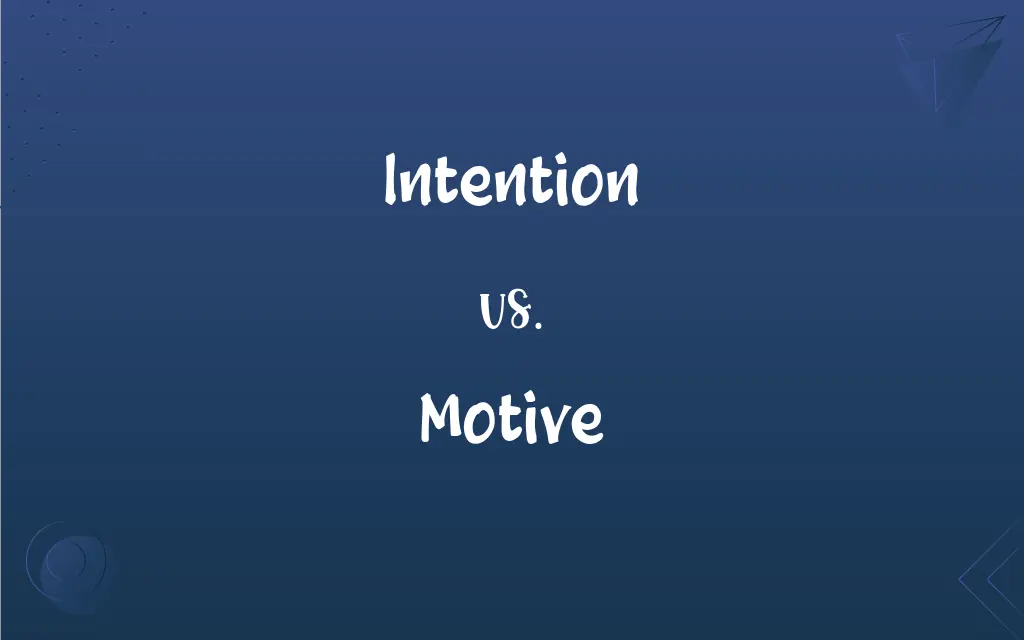Intention vs. Motive: What's the Difference?
Edited by Aimie Carlson || By Harlon Moss || Updated on October 23, 2023
Intention refers to a planned action or goal; motive is the underlying reason for that action.

Key Differences
Intention and motive are two words often used interchangeably, but they describe different aspects of human behavior. Intention pertains to a person's specific plan or goal – what they set out to do. It is a conscious decision to act in a particular way or to achieve a certain outcome. Conversely, motive dives deeper into the psyche, revealing the underlying reason or driving force behind an action.
In the realm of law and ethics, both intention and motive are essential. A person may have the intention to donate to charity – a planned action. Yet, their motive could be multifaceted: it might be out of genuine compassion, a desire for positive publicity, or a tax benefit. Understanding both aspects can provide a fuller picture of a person's choices and behavior.
From a psychological perspective, intention and motive offer insights into human cognition and emotion. Intentions can be shaped by motives, but they can also be influenced by external factors or social norms. For instance, one might have the intention to exercise daily driven by the motive of health, but might also be influenced by societal standards of beauty.
In daily life, understanding one's own intentions and motives can be crucial for personal growth. One might have the intention to apologize after an argument. This intention is a conscious plan to mend a relationship. However, delving into the motive might reveal a desire for peace, a fear of loneliness, or even a tactical move to gain the upper hand in a longer-term dispute.
In essence, while intentions set the stage for planned actions or outcomes, motives illuminate the deeper reasons, emotions, and drives behind those actions.
ADVERTISEMENT
Comparison Chart
Definition
A planned action or goal.
The underlying reason for an action.
Focus
What one plans to do.
Why one wants to do it.
Driven by
Conscious decision and planning.
Deep-seated emotions or reasons.
Contextual Meaning
A purpose or design behind an action.
An impulse or desire that prompts action.
Temporal Aspect
Can be temporary or changing.
Often more stable or long-lasting.
ADVERTISEMENT
Intention and Motive Definitions
Intention
A determined plan to act in a certain way.
Her intention was to finish the project by the end of the month.
Motive
An emotion, desire, or need prompting to action.
Greed was the primary motive behind the crime.
Intention
The design or plan behind an action.
The sculpture was broken, but there was no malicious intention.
Motive
An incentive or inducement.
The promise of a bonus was the motive for their hard work.
Intention
An aim or purpose.
The intention behind the law was to protect consumers.
Motive
The goal or objective of one's actions.
The detective questioned the suspect's motive.
Intention
A concept formed by the mind.
He had the intention of joining the seminar next week.
Motive
The reason behind an action or behavior.
His motive for lying was to protect his friend.
Intention
The resolve or determination with which a person acts.
She approached the task with clear intention.
Motive
A recurrent idea or theme.
The artist's work displayed a motive of nature's beauty.
Intention
The action or fact of intending
Are computers capable of intention?.
Motive
An emotion, desire, physiological need, or similar impulse that acts as an incitement to action.
FAQs
Can a person have a good intention but a negative motive?
Yes, for example, someone might help others (good intention) for selfish recognition (negative motive).
Can someone have multiple motives for a single intention?
Absolutely, an intention can be driven by multiple underlying motives.
Is motive always conscious?
No, motives can be unconscious or not immediately apparent to the individual.
Is understanding one's motives essential for personal growth?
Often yes, understanding motives can provide insight into behaviors and drive positive change.
Can motives be inherited or learned?
Motives can be influenced by both genetic factors and life experiences.
How do intention and motive differ in a legal context?
In law, intention often pertains to one's planned action, while motive delves into the reason behind the action.
Are motives always emotional?
Not always, motives can be rational, emotional, or a mix of both.
Why might understanding someone's intention be important in communication?
Understanding intention can prevent misinterpretations and foster clear communication.
Can motives be hidden or disguised?
Yes, individuals might not always reveal or be aware of their true motives.
In storytelling, how do intention and motive play a role?
Characters' intentions drive the plot, while their motives provide depth and understanding of their actions.
Are intention and motive synonymous?
While related, they are not synonymous; intention is about planned actions, while motive is about underlying reasons.
Can one's environment influence motives?
Yes, external factors like culture, upbringing, and social interactions can shape motives.
How are motives explored in psychology?
Psychologists might use therapies, introspection, or observation to understand an individual's motives.
How do intention and motive relate to free will?
Intentions reflect a person's exercise of free will, while motives might influence the direction of that will.
Can actions exist without clear intentions or motives?
Actions can be reflexive or habitual, sometimes occurring without conscious intention or clear motive.
Can a person's intentions change over time?
Yes, intentions can evolve based on new information or changing circumstances.
Which is more crucial for ethics, intention or motive?
Both are important; ethical judgments can consider the action's intention and the underlying motive.
Do intentions always translate to actions?
Not necessarily, one can have intentions without acting on them.
Can two people have the same intention but different motives?
Absolutely, for instance, two people might donate to charity (same intention) for different reasons (different motives).
Are intentions always explicit?
No, sometimes intentions might be implied or not overtly stated.
About Author
Written by
Harlon MossHarlon is a seasoned quality moderator and accomplished content writer for Difference Wiki. An alumnus of the prestigious University of California, he earned his degree in Computer Science. Leveraging his academic background, Harlon brings a meticulous and informed perspective to his work, ensuring content accuracy and excellence.
Edited by
Aimie CarlsonAimie Carlson, holding a master's degree in English literature, is a fervent English language enthusiast. She lends her writing talents to Difference Wiki, a prominent website that specializes in comparisons, offering readers insightful analyses that both captivate and inform.































































